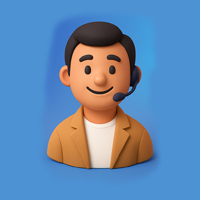
Here at The Creative Unit, we love talking about what we do, but we’re even more proud of who does it. So, we’re kicking off a new series to introduce you to the people behind the results. First up? Anthony Martinez.
Anthony isn't just a title on a business card. He’s one of the sharpest PPC minds we know, the guy who lives and breathes the data, the clicks, and the stories they tell. We grabbed a coffee with him to talk about his unexpected journey into marketing, the real day-to-day of his job, and how he builds campaigns that don’t just get seen—they get results.
We got into the nitty-gritty of what makes PPC campaigns actually work in today's noisy world. He shared a fantastic story about a client win and dropped some serious knowledge on crafting modern marketing messages that cut through the digital clutter.
If all this talk about PPC makes your head spin, you’re in the right place. Contact TCU if you need expert help setting up, managing, and monitoring a campaign that works for you, not against you.
The Accidental Marketer: Anthony’s Path to PPC
You might think a PPC Manager has a degree in data science. Anthony’s background is a little different. He started in graphic design.
“I know, it seems random,” he says with a laugh. “I loved design, but I was always the annoying one in the room asking, ‘But is this working?’ I’d create an ad I thought was beautiful, and then I’d become obsessed with whether it was actually driving people to buy something. That curiosity completely changed my career.”
He taught himself the mechanics of Google Ads, diving into analytics and keyword research after hours. This unique mix—a designer’s eye for what grabs attention and an analyst’s drive for what converts—is his secret sauce. He doesn't just see numbers; he sees the people clicking on them.
“That’s the culture at TCU,” he points out. “It’s not a factory. We look at the data and ask, ‘What is this telling us about our client’s customer?’ That human element is everything.”
So, What Does a PPC Manager Actually Do?
“People see the ads on their screen and have no idea what goes on behind the scenes,” Anthony explains. “My job is equal parts scientist and strategist.”
His day is rarely the same twice, but it always revolves around a few core things:
The Morning Dig:
First thing, he’s deep in the data from the last 24 hours. But he’s not just looking for clicks. He’s hunting for meaning—conversion rates, cost-per-acquisition, and quality scores. “Clicks are vanity,” he says. “Conversions are sanity.”
Playing the Stock Market of Keywords:
He’s constantly adjusting bids and budgets based on performance. It’s a balancing act to make sure every client’s dollar is working as hard as it possibly can.
The Never-Ending Hunt for the Right Word:
The search terms people use change every day. Anthony is always researching new keywords and adding negative keywords to stop wasting money on the wrong clicks.
Writing the Words That Work:
This is his favorite part. He’s constantly writing new ad copy and testing it. Headline A vs. Headline B. Description 1 vs. Description 2. It’s all about finding the language that makes someone stop scrolling and click. This is where those effective modern marketing messages are born.
The TCU Philosophy on PPC
Beyond the Setup.
Anthony is clear about one thing: the biggest mistake a business can make is thinking that setting up a campaign is a one-time task.
“A campaign is like a garden,” he says. “If you just plant the seeds and walk away, you’ll get weeds. You have to water it, prune it, and check the soil. Our job is to be the gardener, nurturing that campaign every single day.”
This means anticipating market shifts, watching what competitors are doing, and adapting strategies in real-time. It’s a proactive, not reactive, approach to PPC campaigns.
How We Turned Clicks into Conversions “A Real-World Win”
Anthony’s eyes light up when we ask for a success story. He tells us about an e-commerce client selling handmade ceramics. They were running ads but burning through their budget with little to show for it.
“They were getting traffic, but no one was buying,” he recalls. “The issue was obvious to us. Their ads were generic—‘Beautiful Handmade Mugs’—and they were competing with every big box store out there. They were getting lost.”
The TCU team, led by Anthony, did a complete overhaul. They found more specific, long-tail keywords. But the real game-changer was the messaging.
“We threw out the generic copy. We wrote ads that focused on their story, the artisan who makes each piece, the unique glazes, the fact that no two mugs are alike. We created modern marketing messages that appealed to someone looking for something special, not just a dish.”
They also built new, highly targeted audience lists to reach people who valued craftsmanship.
The result? “Within three months, we saw their conversion rate shoot up by over 70%. Their cost-per-sale was cut in half. They weren’t just selling more mugs; they were connecting with their true audience. That’s the power of pairing the right data with the right story.”
Anthony’s Unfiltered Advice for Your PPC Journey
For any business owner feeling nervous about diving into paid ads, Anthony has some straight talk.
- Start with the Goal: “Be brutally honest about what you want. Brand awareness? Leads? Direct sales? If you don’t know your destination, no map can help you.”
- Don’t Send People to a Dead End: “Your landing page is your handshake. If your ad promises one thing and your page delivers another, you’ve lost them. Make sure the page is fast, relevant, and has one clear action you want them to take.”
- Test, Then Test Again: “Never fall in love with your first idea. Test your ads against each other. Let the data decide what works best. Your customers will tell you what they want to hear.”
- Play the Long Game: “PPC isn’t a vending machine. You don’t put a dollar in and get a sale out immediately. It takes time to learn and optimize. Patience is not just a virtue; it’s a strategy.”
The Future of PPC: It’s Still Human
With all the talk about AI taking over, Anthony isn’t worried. “The machines are getting amazing at automating bids and finding audiences,” he says. “But they can’t replicate human intuition. They can’t feel a brand’s voice or craft a message that makes someone feel seen.”
He believes the most successful PPC campaigns will always be a powerful partnership between human creativity and machine efficiency. The future of modern marketing messages isn’t less human—it’s more. It’s about using tools to be more personal, more relevant, and more connected than ever before.
And that’s a future Anthony, and everyone at TCU, is pretty excited about.

